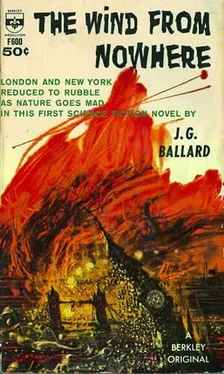Vice-Admiral Saunders, sitting next to him, nodded agreement.
"I hope your information is right, though, Marshall. One of the Americans told me this morning that Venice was a complete writeoff."
"Exaggeration," Marshall said easily. "My latest report a few minutes ago was that there had been heavy flooding, but no serious damage."
The admiral nodded, glad to be reassured. Marshall continued with his survey. Deborah sat just behind him, listening to the steady confident tone. With the exception of Gort, who remained neutral, the three other members of the committee were inclined to be pessimistic and depressed, expecting the worst and misinterpreting the news to serve their unconscious acceptance of disaster. General Harris and Vice-Admiral Saunders were typical of the sort of serviceman in the saddle at the beginning of a war. They had the Dunkirk mentality, had already been defeated and were getting ready to make a triumph out of it, counting up the endless casualty lists, the catalogues of disaster and destruction, as if these were a measure of their courage and competence.
Marshall, Deborah realized, was the necessary counterforce on the team. Although he might be overoptimistic, this was deliberate, the sort of Churchillian policy that would keep people head-up into the wind, doing everything to defend themselves, rather than running helplessly before it. She listened half consciously to Mar shall, feeling his confidence surge through her.
On the way back to Marshall 's office after the meeting closed, they met Symington, carrying a teletype memo in his hand.
"Bad news, I'm afraid, sir. The old Russell Square Hotel collapsed suddenly about half an hour ago. Some of the piles drove straight through the sub-soil into the Piccadilly Line platforms directly below. First estimates are that about two hundred were killed in the Russell basement and about twice that number again in the station."
Marshall took the tape and stared at it blindly for several moments, bunching his fist and drumming it against his forehead.
"Deborah, get this out to all casualty units straight away! About four hundred were down in the station, you say, Andrew? For God's sake, what were they doing there? Don't tell me they were waiting for a train."
Symington gestured with one hand. "I suppose they were sheltering there, the way they did in World War II."
In a burst of exasperation, Marshall shouted: "But that's just what we don't want them to do! They should have been above ground, strengthening their own homes, not just abandoning them and cowering away like a lot of sheep."
Symington smiled wanly. "Properties in the Bloomsbury and Russell Square area are pretty decrepit. High Victorian terraced houses ready for demolition. People there live in single rooms-"
"I don't care where they live!" Marshall cut in. "There are eight million people in this city and they've got to stand up and face this wind together. Once they start thinking of themselves and a warm hole to hide in the whole damn place will blow away."
He swung through into his office. "Call transport," he snapped at Deborah. "Tell them to get a car ready. We'll go out and have a look at this ourselves."
He pulled a heavy trench coat off the door, climbed into it while Deborah hurried over to the phone. As he strode off down the corridor she followed, slipping into her own coat.
The operations deck was on the second floor of the Admiralty building, a honeycomb of small partitioned offices off the narrow high-ceilinged corridors. They passed the overseas news section, made their way through into a wide office which was the UK news reception unit. There were a dozen teletypes taping down an endless stream of information from the major provincial capitals, TV screens flickering with pictures broadcast from mobile transmitter Units all over London, and a trio of operators in direct touch with the Met. Office.
"What are the latest casualties at Russell Square?" Marshall asked a young lieutenant sitting at a desk in front of a TV set, watching the screen as he talked rapidly into a boom mike jutting from his shoulder.
"Heavy, I'm afraid, sir. At least four hundred dead. The station access platforms are in pitch darkness, and they're waiting for the RASC unit at Liverpool Street Station to move their generator down."
The screen was blurred and indistinct, but Marshall could make out the stabbing beams of searchlights playing over the ragged silhouette of the collapsed hotel. Its ten stories had concertinaed to the equivalent of three; many of the windows and balconies were apparently intact, but closer inspection revealed that the floors were separated by an interval of only three or four feet instead of the usual 12.
Marshall took Deborah's arm and led her out of the room into the corridor. They walked down the stairs to the ground floor. The building was equipped with its own generator but its power was inadequate to move the heavy elevator.
All the windows they passed were securely boarded. Outside, ten-foot-thick walls of sandbags had been stacked up to the roof, roped into an impenetrable wall. As they neared the ground floor, however, Deborah felt the building shudder slightly as a massive draught of air struck it, stirring the foundations in their clay beds. The movement stabbed at her heart, and she stopped for a moment and leaned against Marshall. He put an arm around her shoulders, smiled reassuringly.
"All right, Deborah?" His hand cupped the round swell of her shoulder through the jacket.
"Just about. I'm afraid it startled me."
They moved down the steps, Marshall slowing his pace for her. The tremor continued as the building settled itself into new foundations.
"Something big must have come down," Marshall said. "Probably the Palace, or No. 10 Downing Street." He gave a light laugh.
At the bottom of the steps there was a revolving door; heavy rubber flaps making the seal airtight. Inside the building the air was filtered, the suites of offices and the operations deck contained in a warm, noiseless world. Beyond the revolving doors, however, in the corridors leading to the transport bay and the service units, the air seeped in through the casing of sandbags, driven by the tremendous pressure of the wind outside, and through the glass panels of the revolving doors they could see the floor, thick with dust and grime, chilled by sudden gusts of air bursting through pressure points.
Marshall put up his collar, led them briskly down the corridor to an orderly room by the rear exit, where he collected their driver. Five or six exhausted men in dirty khaki uniforms sat around a table drinking tea. Their faces looked pinched and sallow. For three weeks now no one had seen the sun; the dust clouds dimmed the streets, turned noon into a winter evening.
Marshall 's driver, a small wiry corporal called Musgrave, unlocked a narrow panel door in the steel blast-proof bulkhead at the end of the corridor. Deborah and Marshall followed him into a lowceilinged garage where three armored cars were parked. They were M53-pattern Bethlehems, square ten-ton vehicles with canted armored sides designed originally to deflect high-velocity shells and now ideal shielding for surface units moving about in the wind. Their 85 mm. guns had been removed, and in place of the original mounting six-inch-thick perspex window pieces had been fastened.
After helping Deborah into the truck, Marshall followed, swinging himself up in two easy powerful movements. Musgrave tested the hatch, then climbed into the driver's seat beside the engine and pulled the hatch over himself.
He drove the car forward across the garage floor, and edged it up onto the wide steel plate of a hydraulically operated elevator shaft. Remote controlled from the car's radio, the elevator rose slowly into the air on its single pylon, carrying the car upward into a narrow well in the roof of the garage. As it neared the top the roof retracted sideways, and the Bethlehem emerged into the rear courtyard, between Admiralty House and the Foreign Office Annex.
Читать дальше









